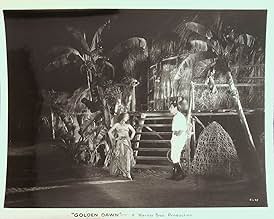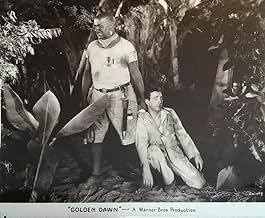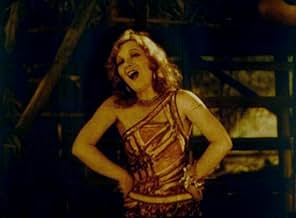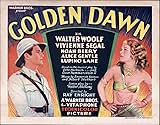अपनी भाषा में प्लॉट जोड़ें"Golden Dawn" is a musical operetta released by Warner Brothers, photographed entirely in Technicolor, and starring Walter Woolf King and Noah Beery. The film is based on the semi-hit stage ... सभी पढ़ें"Golden Dawn" is a musical operetta released by Warner Brothers, photographed entirely in Technicolor, and starring Walter Woolf King and Noah Beery. The film is based on the semi-hit stage musical of the same name by Oscar Hammerstein II and Otto Harbach."Golden Dawn" is a musical operetta released by Warner Brothers, photographed entirely in Technicolor, and starring Walter Woolf King and Noah Beery. The film is based on the semi-hit stage musical of the same name by Oscar Hammerstein II and Otto Harbach.
- निर्देशक
- लेखक
- स्टार
Walter Woolf King
- Tom Allen
- (as Walter Woolf)
Sôjin Kamiyama
- Piper
- (as Sojin)
Eduardo Cansino
- Secondary Supporting Role
- (बिना क्रेडिट के)
Nigel De Brulier
- Hasmali - the Witch Doctor
- (बिना क्रेडिट के)
Nick De Ruiz
- Napoli
- (बिना क्रेडिट के)
Frank Dunn
- Secondary Supporting Role
- (बिना क्रेडिट के)
Ivan F. Simpson
- Secondary Supporting Role
- (बिना क्रेडिट के)
फ़ीचर्ड समीक्षाएं
...What a grand time they would have sending up this putrid songfest, based on a stage musical that wasn't very successful to begin with. One of the last of the first wave of movie musicals, and surely one of the worst: a preposterous operetta about a light-skinned African princess and the white soldier who loves her. (It turns out she's white, too, so it's okey-doke. I'm not spoiling anything.) Howlingly racist even for its day, what with the united forces of the noble Old World benevolently keeping the peace among the "heathens" of Boer-controlled Africa. (Can this be the same Oscar Hammerstein who wrote "Show Boat" more or less concurrently?) Ineptly shot, paced, and acted, with a number of white actors in blackface, including an unforgivable Noah Beery, his dusky makeup slowly melting under the hot lights.
All that said, it's a rare chance to see the great stage star Vivienne Segal in a lead, and the famous British comic Lupino Lane do a fun eccentric dance. The Kalman score is quite pretty, too, if you can tune out the lyrics. But unless you're a connoisseur of operetta or a lover of grotesquely bad movies, the whole thing is just about unwatchable.
All that said, it's a rare chance to see the great stage star Vivienne Segal in a lead, and the famous British comic Lupino Lane do a fun eccentric dance. The Kalman score is quite pretty, too, if you can tune out the lyrics. But unless you're a connoisseur of operetta or a lover of grotesquely bad movies, the whole thing is just about unwatchable.
I recently saw a book on bizarre movies featuring cheap space monsters, Bad Biker Boys, and Bad Babes in Bikinis. That's not bizarre, that's boring! Now Golden Dawn, here's a bizarre movie for you! Prisoners of war in the middle of the African jungle with the natives wanting to do a human sacrifice...and in the middle of it all we have Lupino Lane (bless his soul) doing a happy go-lucky jig. Unlike most cult films, this had a budget, and was expected to be taken as serious film making when it came out.
Believe me, I can see why people would give this a low rating. But if you're into saying "Huh?" and wondering what people were thinking when they were creating something...this is for you.
Believe me, I can see why people would give this a low rating. But if you're into saying "Huh?" and wondering what people were thinking when they were creating something...this is for you.
True, as a film, this is ludicrous, with "native African" Noah Beery speaking in a combination of U.S. Southern Black ("I'se gwine...")and cowboy dialects ("I'm a gonna pump ya plum full of lead")and some horrendous choreography. But there is some beautiful music from perhaps the greatest composer of Viennese operetta: Emmerich Kalman. This movie is based on Kalman's operetta "Golden Dawn," which premiered in New York in 1927. Especially noteworthy are two Kalman songs: "Just We Two" and a lovely ballad "You Are the One." To fully enjoy the music, one must,of course, ignore the fact that the lilting Viennese melodies and sometimes-Hungarian harmonies seem just a bit out of place in Africa.
What can I say about Golden Dawn? To describe it as jawdroppingly, breathtakingly, deliriously bad does not come close to doing it the justice it so richly deserves. Film aficionados describe it affectionately as The Second Worst Musical Ever Made (the first being the legendary Howdy Broadway), yet even that hallowed title cannot prepare you for the cheesy wonders in store. Racist, sexist...did I mention racist?...this is a film that must be seen to be believed, and even then you'll wonder if someone slipped you something. The film is based on the semi-hit stage musical of the same name and boasts musical numbers by Oscar Hammerstein, Jr., who really should have known better. From the moment Noah Beery steps on stage in embarrassing blackface to warble an ode to his whip, to the hallucinatory Hymn to Domestic Violence sung (badly) by Marion Byron, to the truly indescribable moment when Vivienne Segal belts out a showstopping "My Bwanna," the laughs just never stop. You'll laugh, you'll cry, you'll wonder who in the hell thought that making a pseudo-Viennese operetta about colonial Africa was a good idea, you'll...but you catch my drift. This movie is available on the Dawn of Sound laserdisc set, but I have decided to hold out for the Collectors Edition Director's Cut DVD with several language tracks, a Making of Golden Dawn documentary, and a whole lot of film-school twaddle on the commentary track. My advice to you is if you insist upon seeing this film-and I cannot recommend it to the faint of heart-do not do so alone! Make sure you are surrounded by friends, and are in a calm, familiar environment. Have oxygen ready and make sure your First Aid kit is fully stocked. It might be best to notify the authorities in advance. I ignored this sage advice for my first viewing and almost swallowed my own tongue. And do not even THINK about popcorn. Golden Dawn is a full-on three martini film. Better yet, just chug the gin from the bottle.
10woid
and one of the funniest movies I've ever seen.
Not intentionally, though.
It's an operetta set at a camp for English prisoners being held by the Germans somewhere in the African jungle. There are dozens of native extras, all of them black actors, whose main function in the story is to prostrate themselves toward whichever white lead happens to be singing in the vicinity.
And yes, all of the lead actors are white, a little awkward since many of them are playing natives of the same tribe as the actually black extras. Their skin tones range from burnt cork (Noah Beery) to snow white (the golden Dawn herself). The plot revolves around whether the obviously white Dawn is really black. I can't tell you how it comes out -- that would be a spoiler.
Dawn's mother, a slightly darker shade of makeup, wears earrings and pearls and sort of resembles Margaret Dumont.
Speaking of whom, the male lead is played by Walter Woolf, who, as Walter Woolf King, plays the villain tenor Rodolfo Lassparri in "A Night At The Opera." When this, uh, dawned on me, I actually shouted out, just like Groucho as Otis B. Driftwood, "Lassparri?!?!?!"
This is racism too ridiculous to be objectionable. Instead, like the (intentional) loony racial stereotypes in "Blazing Saddles," it's hysterical.
Noah Beery (brother of Wallace, father of Jr.) plays Shep Keyes, who speaks and sings in an exaggerated stereotypical southern black dialect, full of "gwines" and so on. Is he supposed to be American? African? No idea. Then there's the native second female lead character, apparently (made up to be) African, but doing the same shufflin' accent as Beery. Is it just me, or does she bear a startling resemblance to Andrea Martin?
There are so many little delights, other absurd characters and "comic" subplots, moments to cherish. The Whip song! My Bwana! A Tigah! The final, shocking, revelations! Why are you reading this? Go forth, do whatever it takes to find a copy of this movie, and watch it!
Not intentionally, though.
It's an operetta set at a camp for English prisoners being held by the Germans somewhere in the African jungle. There are dozens of native extras, all of them black actors, whose main function in the story is to prostrate themselves toward whichever white lead happens to be singing in the vicinity.
And yes, all of the lead actors are white, a little awkward since many of them are playing natives of the same tribe as the actually black extras. Their skin tones range from burnt cork (Noah Beery) to snow white (the golden Dawn herself). The plot revolves around whether the obviously white Dawn is really black. I can't tell you how it comes out -- that would be a spoiler.
Dawn's mother, a slightly darker shade of makeup, wears earrings and pearls and sort of resembles Margaret Dumont.
Speaking of whom, the male lead is played by Walter Woolf, who, as Walter Woolf King, plays the villain tenor Rodolfo Lassparri in "A Night At The Opera." When this, uh, dawned on me, I actually shouted out, just like Groucho as Otis B. Driftwood, "Lassparri?!?!?!"
This is racism too ridiculous to be objectionable. Instead, like the (intentional) loony racial stereotypes in "Blazing Saddles," it's hysterical.
Noah Beery (brother of Wallace, father of Jr.) plays Shep Keyes, who speaks and sings in an exaggerated stereotypical southern black dialect, full of "gwines" and so on. Is he supposed to be American? African? No idea. Then there's the native second female lead character, apparently (made up to be) African, but doing the same shufflin' accent as Beery. Is it just me, or does she bear a startling resemblance to Andrea Martin?
There are so many little delights, other absurd characters and "comic" subplots, moments to cherish. The Whip song! My Bwana! A Tigah! The final, shocking, revelations! Why are you reading this? Go forth, do whatever it takes to find a copy of this movie, and watch it!
क्या आपको पता है
- ट्रिवियाThe Technicolor version is apparently lost; only the black and white version survives.
- गूफ़Composer Herbert Stothart is billed as "Hubert" in the opening credits.
- साउंडट्रैकAfrica Smiles No More
(1930) (uncredited)
Music by Harry Akst
Lyrics by Grant Clarke
Sung by Alice Gentle
टॉप पसंद
रेटिंग देने के लिए साइन-इन करें और वैयक्तिकृत सुझावों के लिए वॉचलिस्ट करें
विवरण
- रिलीज़ की तारीख़
- कंट्री ऑफ़ ओरिजिन
- भाषा
- इस रूप में भी जाना जाता है
- Aurora dorada
- फ़िल्माने की जगहें
- उत्पादन कंपनी
- IMDbPro पर और कंपनी क्रेडिट देखें
- चलने की अवधि
- 1 घं 21 मि(81 min)
- रंग
- Color(2-strip Technicolor, original print)
इस पेज में योगदान दें
किसी बदलाव का सुझाव दें या अनुपलब्ध कॉन्टेंट जोड़ें


















